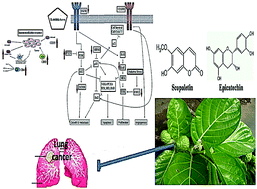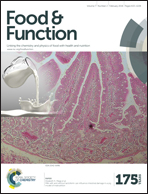Morinda citrifolia edible leaf extract enhanced immune response against lung cancer
Abstract
Lung cancer causes 1.4 million deaths annually. In the search for functional foods as complementary therapies against lung cancer, the immuno-stimulatory properties of the vegetable Morinda citrifolia leaves were investigated and compared with the anti-cancer drug erlotinib. Lung tumour-induced BALB/c mice were fed with 150 mg kg−1 or 300 mg kg−1 body weight of the leaf extract, or erlotinib (50 mg kg−1 body-weight) for 21 days. The 300 mg kg−1 body weight extract significantly (and dose-dependently) suppressed lung tumour growth; the extract worked more effectively than the 50 mg kg−1 body weight erlotinib treatment. The extract significantly increased blood lymphocyte counts, and spleen tissue B cells, T cells and natural killer cells, and reduced the epidermal growth factor receptor (EGFR) which is a lung adenocarcinoma biomarker. The extract also suppressed the cyclooxygenase 2 (COX2) inflammatory markers, and enhanced the tumour suppressor gene (phosphatase and tensin homolog, PTEN). It inhibited tumour growth cellular gene (transformed mouse 3T3 cell double minute 2 (MDM2), V-raf-leukemia viral oncogene 1 (RAF1), and mechanistic target of rapamycin (MTOR)) mRNA expression in the tumours. The extract is rich in scopoletin and epicatechin, which are the main phenolic compounds. The 300 mg kg−1Morinda citrifolia leaf 50% ethanolic extract showed promising potential as a complementary therapeutic dietary supplement which was more effective than the 50 mg kg−1 erlotinib in suppressing lung adenocarcinoma. Part of the mechanisms involved enhancing immune responses, suppressing proliferation and interfering with various tumour growth signalling pathways.


 Please wait while we load your content...
Please wait while we load your content...